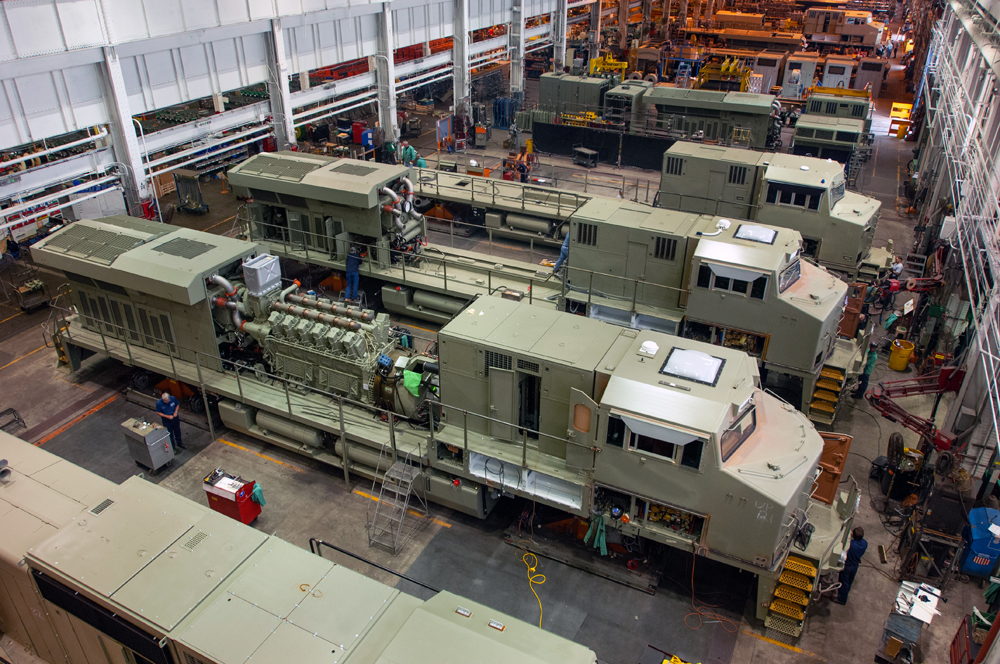
ERIE, Pa. — An official in Erie County says that Wabtec may be preparing to close its locomotive plant in Erie if it does not reach a new labor agreement with 1,400 striking workers.
County Executive Brenton Davis said in a statement Wednesday that he had confirmed that “Wabtec was visited by representatives of a major third-party contractor that manufactures many, if not all, of the locomotive components currently assembled at the Erie plant,” and said this was “a troubling development that suggested the company could be considering a plant closure.”
Workers from Locals 506 and 618 of the United Electrical, Radio and Machine Workers of America walked out on June 22 after their prior contract expired June 10. While the Erie facility was at one time the only plant for manufacture of General Electric locomotives, GE opened a second, non-union plant in Fort Worth, Texas, in 2012. GE Transportation merged into Wabtec in 2019 [see “GE-Wabtec merger …,” Trains News Wire, Feb. 26, 2019].
Davis called for the company and its striking workers to reach a tentative agreement that could be put to a vote of the employees.
“This plant should not disappear without at least a vote of the workers whose livelihoods are at stake,” Davis wrote. “Any strike, layoff, or plant closure would have grave effects on our local economy and in the households of those abruptly unemployed. As County Executive, I am prepared to do whatever it takes to see this situation resolved and manufacturing is preserved in Erie.”
The Pittsburgh Post-Gazette reports that Wabtec spokesman Tim Bader declined to comment on the Davis press release, but said in a prepared statement that the company “is being forced to consider difficult decisions to continue supporting its customers and deliver on its commitments.” The company has sought an agreement “that would best position its employees and the Erie site for success,” he said, calling the Erie plant “a laggard in terms of cost and efficiency for years as compared to other Wabtec sites and suppliers.”
Wabtec has said it has offered $41 million in wage improvements in a new contract, but union demands on “new hire wages and unfettered right to strike seem out of touch with the economic realities.”
The Erie Times-News reports Local 506 President Scott Slawson indicates the plant’s progressive pay scale is a key issue. Currently, legacy employees earn an average of $35 an hour; new workers start at about $22 an hour and progress to full wages over 10 years. The union sought to eliminate the phased-in pay scale but in its most recent proposal suggested a five-year period to raise the wages to the legacy level, but the company has rejected all proposals regarding the existing progressive scale.
On general wage increases, Slawson said, the sides are “not that far apart,” with the union calling for increases of 4%, 3.5%, 3%, and 3.5% over four years; Wabtec’s last offer included a 3.4% increase the first year, a $3,000 bonus on ratification, two 2.5% increases, and another $2,000 lump-sum payment later in the contract.
The Wabtec plant employs a total of about 2,000 people and is Erie County’s third-largest employer.














First, $238,000 is not a lot of money.
Second, $35/hour is pretty good for manufacturing – even of you have to live in Erie, Pa.
Third, unions exist to extract dues and pay off the union bosses.
The Teamsters put Yellow out (20,000 jobs) to pressure UPS. Granted, Yellow management wasn’t good; the union just gave the final push.
Both parties are in need of compromise! Union members are going to see their jobs going away and then listen to them whine!
Ed Burns
Retired Class 1 and a 40 year member of the BRAC/TCU.
“Out-of-touch” is executive code for we don’t want to pay you any increase despite quality work and inflation. This factory has been the pride of Wabtec and GE for decades. This is a move to attack skilled labor and move jobs to lower pay in a right-to-work-for-less state (TX) where pay and workers’ rights go to die.
The old Corporate playbook that served so well at intimidating & threatening the Boomer workforce all those decades isn’t gonna work anymore in this day and age of a shrinking workforce & the Y & Z & beyond generations who have been taught that their all very special individuals. People with the technical skills of these workers can easily find another good paying job they are in high demand in other industries. UPS caved to their workers because they knew they couldn’t begin to find replacement worker in this job market. Hopefully this environment will create a better life for future generations who will not have to endure the hardships & hostile work environments many Boomers have experienced.
Wabtec margins in the freight division has been dropping. (15% today) Right now most of the order book is coming from the Transit Division. Plus they have had a large drop in cash on hand due to them buying out several companies in the past 2 years, many of them offshore.
While their overall revenue is healthy due to the recent acquisitions, its pretty clear they are allocating assets to purchase other revenue sources and getting vertical in their supply chain.
I assume since Tier 4 freight locos are the most expensive to build and have more margin to work with, they have them built at Erie to cover it. But if no orders are coming in then the overhead goes through the roof.
Do not forget that new locomotive orders are zero for 3 years in a row. Tier 4 compliance is expensive to buy and maintain. Please search “new locomotive orders” to be informed. Environmental mandates are not free and must be paid with profit dollars. Or the business simply dies.
Yet the Wabtec CEO is receiving about $11.69 million annually in compensation and stock bonuses. Average executive compensation for Wabtec is listed as a bit over $238,000 annually.
Perhaps some of the largesse should be shared with the folks actually performing the work that keeps the lights on and the executives “well juiced”.
BNSF and CN have ordered and received new Tier 4 units in the last 6-9 months. The BNSF units were super heavy 6 motor ET44AC’s. I believe that the locos were built in Texas.
I’m all for fighting when there’s a chance at winning. But this situation has GMD London written all of it. The workers at the engine plant might have more leverage.
A strike vote is the last option for any union member to use in his/her quest for better pay, benefits or working conditions. It is never taken lightly I assure you. Hang in their Brothers and Sisters. Chris Thompson, Retired Lineman, IBEW Local 345.
The workers are right. Corporate greed is what has decimated the US economy. Look no further than East Palestine and PSR. Wabtec is no different as an economic sociopath.
Wabtec may be, in your words, “an economic sociopath” but it makes locomotives that pull trains we depend on for our standard of living.
Charles, Wabtec opened a plant in Mexico. Seeing Curt’s comment above about the Wabtec CEO compensation. These people only have loyalty to their Wall Street masters and stuffing their own pockets. They have no concern for the public or stakeholders.
Here we go again. The union(s) destroying their own jobs in order to save jobs. Incredible.
This is what usually happens to people who think that they are irreplaceable.
It’s what happens to experienced, skilled labor when a highly profitable firm decides only executives averaging $238,000 and an $11.7 million CEO believe only they should be fairly compensated.